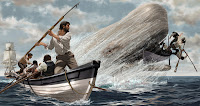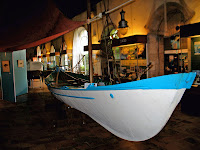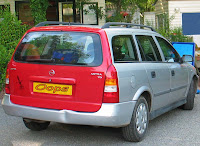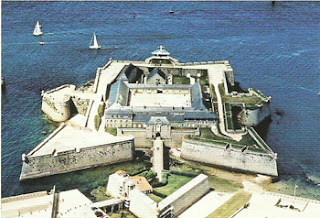Liz and I worked a season for a UK holiday company in Brittany.To jazz up our reception area I wrote a series of "off line blogs chronicling our days off. Meant to be a sanitised travelogue, of the sort you find in an in-flight magazine, it didn’t always turn out that way
Today we went to Roscoff. To quote the Brittany Ferries in-voyage magazine, “it is always a surprise for first time visitors, its charming old town, and quirky shops contrasting with the wide waters”… a sentence unlikely to win any travel writer’s award, nevertheless, true enough. You can catch a boat to the Isle de Batz, ride a road train around the town, or wonder why there appears to be a bridge from the harbour to an apparently random point mid channel. My theory for this seemingly pointless construction centred on concrete fatigue, but it turns out the walkway leads to the deep water ferry. We avoided the bars and cafés on the front, obviously installed to trap one visit travellers and infiltrated the Boulangerie Centrale only one street back and favoured by the French. A winner.

A small side street (Rue Ellé) leads off from behind the church, on the right if coming from the town bridge, follow this up over another very picturesque little bridge and turn left. Follow this road until you feel you can go further and you will have arrived.
SUMMER
2011
Pete and Liz’s off line blog
9
Today we went to Roscoff. To quote the Brittany Ferries in-voyage magazine, “it is always a surprise for first time visitors, its charming old town, and quirky shops contrasting with the wide waters”… a sentence unlikely to win any travel writer’s award, nevertheless, true enough. You can catch a boat to the Isle de Batz, ride a road train around the town, or wonder why there appears to be a bridge from the harbour to an apparently random point mid channel. My theory for this seemingly pointless construction centred on concrete fatigue, but it turns out the walkway leads to the deep water ferry. We avoided the bars and cafés on the front, obviously installed to trap one visit travellers and infiltrated the Boulangerie Centrale only one street back and favoured by the French. A winner.
 |
I have always thought eating out should be an experience, a mini adventure, and involve more than just having a plate of food plonked in front of you. In Thailand

Pete and Liz’s off line blog 10
 Funny how things turn out, the wheel of life, the interconnectedness of things, serendipity perhaps. I have recently finished reading Moby Dick which I humbly submit to the committee as the greatest book of all time. Today we decided for no better reason other than it was raining to go to the
Funny how things turn out, the wheel of life, the interconnectedness of things, serendipity perhaps. I have recently finished reading Moby Dick which I humbly submit to the committee as the greatest book of all time. Today we decided for no better reason other than it was raining to go to the Museum of Fishing New Bedford
 The museum is an interesting way of spending a couple of hours or so, much to look at and absorb and although most of the explanatory signs are in French there are a few English translations. These though tend to the bland and ineffectual. A nod to a multi lingual audience without much thought to content.
The museum is an interesting way of spending a couple of hours or so, much to look at and absorb and although most of the explanatory signs are in French there are a few English translations. These though tend to the bland and ineffectual. A nod to a multi lingual audience without much thought to content.
We enjoyed it, felt culturally improved and learnt a thing or two. Worth the €6.50 entrance fee, definitely, no doubt about it.

 It’s not often you pass llama and two thirds of a push-me-pull-you grazing laconically beside the road, not often, in fact hardly ever, just this once in fact. Either that or they put something in the coffee.
It’s not often you pass llama and two thirds of a push-me-pull-you grazing laconically beside the road, not often, in fact hardly ever, just this once in fact. Either that or they put something in the coffee.  Although the motivation for our visit was the Indies Museum, having just read “The Prize of All the Oceans” by Glyn Williams an account of dastardly seafaring by the British government of the mid 1700’s the €6 entrance fee turns out to include the National Maritime Museum and access to the place where it is all housed, “one of the most beautiful citadels on the French coast”. A walk around the ramparts, dated 1616, 48 years before lager was invented, offers some spectacular views of the harbour and to quote the English translation in the museum’s brochure “the roadstead to the l’île de Groix”. For roadstead read sea lane??
Although the motivation for our visit was the Indies Museum, having just read “The Prize of All the Oceans” by Glyn Williams an account of dastardly seafaring by the British government of the mid 1700’s the €6 entrance fee turns out to include the National Maritime Museum and access to the place where it is all housed, “one of the most beautiful citadels on the French coast”. A walk around the ramparts, dated 1616, 48 years before lager was invented, offers some spectacular views of the harbour and to quote the English translation in the museum’s brochure “the roadstead to the l’île de Groix”. For roadstead read sea lane??
Finally there is the “Memories of the Elephant” exhibition, a themed display revolving loosely around the “fascination and exoticism” of this “emblematic figure”. Or stuff with elephants on, ceramics, clothing, paintings and suchlike.
An enjoyable few hours, lots to see and to think about although in places it is more interesting for what it doesn’t say. There is unfortunately little in English to read, all the films and audio interviews are in French. Nevertheless if any of these subjects light your fire or you are a museum junkie recommended.
 So, last Tuesday, a day off, the project was finding a new one. The cost of a new rear door from a dealer would have been astronomical, so much in fact that we didn’t even bother asking the question. Instead we went to a local Casse or scrap-yard. These are it seems big business in
So, last Tuesday, a day off, the project was finding a new one. The cost of a new rear door from a dealer would have been astronomical, so much in fact that we didn’t even bother asking the question. Instead we went to a local Casse or scrap-yard. These are it seems big business in France and run much like an Argos England  We stopped on the way back to ask the local garage if they could fit it. Not today he replied. Tomorrow, come back tomorrow. When was the last time a garage in
We stopped on the way back to ask the local garage if they could fit it. Not today he replied. Tomorrow, come back tomorrow. When was the last time a garage in England UK  I had realised early on in the proceedings that he was probably trying to save me money, and getting me to do the easy bits freed him up to do work he had booked in. The village garage proprietor was doubtless friends with the campsite owner and one his best customers. I was though unprepared for what happened next. “Merci monsieur, c’est fini, toute
I had realised early on in the proceedings that he was probably trying to save me money, and getting me to do the easy bits freed him up to do work he had booked in. The village garage proprietor was doubtless friends with the campsite owner and one his best customers. I was though unprepared for what happened next. “Merci monsieur, c’est fini, toute marche

This was by all accounts an extraordinary and uplifting experience, a day and a man who will forever have a place in a corner of my mind. Why he trusted me with his tools, why he chose to offer his years of professional experience for no payment I still don’t know, that he did was of course a result, not just because I saved a few quid, always a bonus, but far more than that, he was a genuinely nice guy, a formidable engineer and according to Le Camping, the last honest motor mechanic in France, somebody who changed the way I look at the world, somebody it was a privilege to have briefly encountered. And the tragedy is, I don’t know his name, his workshop bears no signboards, why would he need them, legends don’t need to advertise. Not just another day, but one which makes you glad you took the job and almost makes you glad you broke the car in the first place, a dented bumper and two tone bodywork a small price to pay for the richness of such an experience. I can’t wait for a customer’s car to break down; there is only one possible recommendation.
 |
Herman
Melville
(1819-1891)
|
 Funny how things turn out, the wheel of life, the interconnectedness of things, serendipity perhaps. I have recently finished reading Moby Dick which I humbly submit to the committee as the greatest book of all time. Today we decided for no better reason other than it was raining to go to the
Funny how things turn out, the wheel of life, the interconnectedness of things, serendipity perhaps. I have recently finished reading Moby Dick which I humbly submit to the committee as the greatest book of all time. Today we decided for no better reason other than it was raining to go to the  The museum is an interesting way of spending a couple of hours or so, much to look at and absorb and although most of the explanatory signs are in French there are a few English translations. These though tend to the bland and ineffectual. A nod to a multi lingual audience without much thought to content.
The museum is an interesting way of spending a couple of hours or so, much to look at and absorb and although most of the explanatory signs are in French there are a few English translations. These though tend to the bland and ineffectual. A nod to a multi lingual audience without much thought to content.
The museum is also an astounding display of the model builder’s craft with numerous miniature ships, and dioramas of sea and shore showing different trawling methods. There is a 1/6 th scale model of a small sail equipped fishing vessel, which took 5 people 5 years to complete, a work of art in itself.
There are no interactive displays and one video, in French, so small children may not fully appreciate the richness of the experience but you do get to go round a real trawler, a small one perhaps but it needed 10 crew or so and is an intriguing glimpse into the world behind the fish finger.
*****************
This Tuesday we thought we would be cultural and set out for Port Louis , across the bay from Lorient to the Museum of the Indies Company, the French equivalent of the British East India Company, who between then shamelessly exploited the “New World ”. We took in the centre of Port Louis

 It’s not often you pass llama and two thirds of a push-me-pull-you grazing laconically beside the road, not often, in fact hardly ever, just this once in fact. Either that or they put something in the coffee.
It’s not often you pass llama and two thirds of a push-me-pull-you grazing laconically beside the road, not often, in fact hardly ever, just this once in fact. Either that or they put something in the coffee.  Although the motivation for our visit was the Indies Museum, having just read “The Prize of All the Oceans” by Glyn Williams an account of dastardly seafaring by the British government of the mid 1700’s the €6 entrance fee turns out to include the National Maritime Museum and access to the place where it is all housed, “one of the most beautiful citadels on the French coast”. A walk around the ramparts, dated 1616, 48 years before lager was invented, offers some spectacular views of the harbour and to quote the English translation in the museum’s brochure “the roadstead to the l’île de Groix”. For roadstead read sea lane??
Although the motivation for our visit was the Indies Museum, having just read “The Prize of All the Oceans” by Glyn Williams an account of dastardly seafaring by the British government of the mid 1700’s the €6 entrance fee turns out to include the National Maritime Museum and access to the place where it is all housed, “one of the most beautiful citadels on the French coast”. A walk around the ramparts, dated 1616, 48 years before lager was invented, offers some spectacular views of the harbour and to quote the English translation in the museum’s brochure “the roadstead to the l’île de Groix”. For roadstead read sea lane??
The guardroom, an empty chamber under the castle is just that until you wonder what it must have been like, filled with men without access to power showers, Imperial Leather or DVDs in winter clustered around the fire, doing their best to stave off the cold and boredom of life in the Duke’s service.
We moved on through the Powder Room and an exhibition of munitions and maritime artillery to the Naval Museum
We are in awe of the sea and its potential to wreak havoc on man’s best laid plans. This is a place to appreciate just what power it can unleash and the professionalism and courage of those men and woman work with it.
Another section is dedicated to underwater archaeology and is a fascinating glimpse into a world that we mere leisure divers limited to 40 meters or so will never encounter. Deep under the ocean at depths where a leak in a submersible can produce a jet of water powerful enough to cut a man in half, wearing t shirts and looking more like actors in an Alien film scientists unearth and recover long lost cargo’s, china plates, a ship’s bell. And after watching the film you can see the objects themselves. Wonderful!
We moved on to the original reason for the trip, the museum of the Indies Company. Despite the spin, these weren’t on the whole very nice people, they traded in slaves, press ganged the unwary onto ships crews, and didn’t particularly mind if a few hapless souls fell out of the rigging. This museum features impressive models of the vessels of the era, showing in detail the stowing of the cargos, that the porcelain went to the lowest point and so on, but curiously no holds of ensnared humanity enduring the indifference of a morally bankrupt trading system. There is a passing reference to slavery it has to be said but on the whole this is a heavily sanitised view of a barbaric enterprise.
An enjoyable few hours, lots to see and to think about although in places it is more interesting for what it doesn’t say. There is unfortunately little in English to read, all the films and audio interviews are in French. Nevertheless if any of these subjects light your fire or you are a museum junkie recommended.
By the way a push-me-pull-you is a friend of Dr Doolittle. The picture is a Bactrian camel originally from south-western Mongolia and north-western China
In 2005 there were less than a 1000 left in the wild.
*****************
Off- Line Blog 11, What a Wonderful World
I have made a startling discovery. Trees, can instantly relocate themselves without warning. I know this because I backed our car into one, and irretrievably damaged the tailgate, so much so that we couldn’t open it and had to tape a plastic bag over the place where the rear window should have been.
 So, last Tuesday, a day off, the project was finding a new one. The cost of a new rear door from a dealer would have been astronomical, so much in fact that we didn’t even bother asking the question. Instead we went to a local Casse or scrap-yard. These are it seems big business in
So, last Tuesday, a day off, the project was finding a new one. The cost of a new rear door from a dealer would have been astronomical, so much in fact that we didn’t even bother asking the question. Instead we went to a local Casse or scrap-yard. These are it seems big business in  We stopped on the way back to ask the local garage if they could fit it. Not today he replied. Tomorrow, come back tomorrow. When was the last time a garage in
We stopped on the way back to ask the local garage if they could fit it. Not today he replied. Tomorrow, come back tomorrow. When was the last time a garage in  I had realised early on in the proceedings that he was probably trying to save me money, and getting me to do the easy bits freed him up to do work he had booked in. The village garage proprietor was doubtless friends with the campsite owner and one his best customers. I was though unprepared for what happened next. “Merci monsieur, c’est fini, toute
I had realised early on in the proceedings that he was probably trying to save me money, and getting me to do the easy bits freed him up to do work he had booked in. The village garage proprietor was doubtless friends with the campsite owner and one his best customers. I was though unprepared for what happened next. “Merci monsieur, c’est fini, toute 





No comments:
Post a Comment